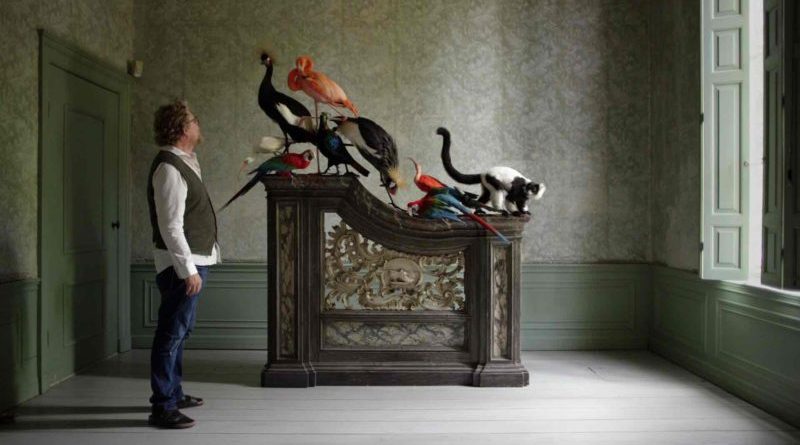INTERVIEW: ‘Stuffed’ doc looks at world of taxidermy
Photo: Erin Derham directed the new documentary Stuffed, about taxidermists, including Ferry van Tongeren. Photo courtesy of Music Box Films / Provided by Film Forum press site with permission.
Stuffed, the new documentary from director Erin Derham, takes a noncritical look at the surprisingly intricate world of taxidermy. The acclaimed film is currently playing the Film Forum in New York City, where Derham has made several appearances for Q&A sessions.
“I knew I was going to do a documentary about conservation,” Derham said in a recent phone interview. “My degrees are in environmental history, and my financing partner is also an environmentalist. So we were looking into subjects about conservation, like a way to talk about nature that wasn’t boring, like finger-waggy, and Rachel Price, my partner, sent me an email saying, ‘What about taxidermy?’ And I was really grossed out because I’m vegan. I was really grossed out by that concept because I didn’t know anything about it.”
However, before giving a final “no” to her business partner, Derham did her due diligence and took a weekend to research the subject of taxidermy. Almost immediately, she fell in love with the history, artistry and science of the age-old hobby. She was hooked.
“It was this subject that I knew nothing about, and it really opened my eyes to how my ignorance shielded me from learning something really interesting, or almost shielded from learning something really interesting,” she said. “So I knew it was enough to make a movie about, and as soon as I started meeting taxidermists, I realized that I was going to be able to tell a story through their experiences and their eyes. It was a very unlikely subject that I would never have done or thought I would ever do, but it’s been a really powerful experience.”
This 180 that Derham has undergone is similar to what audience members are experiencing. One might expect a fairly progressive and environmentally-friendly crowd at the Film Forum, perhaps some with similar thoughts to Derham’s earlier assumptions, but the audiences are being persuaded to give a second look at taxidermy.
“We’re even changing the way we’re marketing the film because that is the #1 response we’re getting is people saying, ‘Oh, my friend made me come to this screening because she’s into taxidermy, or he’s into taxidermy. And I fell in love,'” the filmmaker said. “And I had a reporter for a magazine I love, and she wrote a rave review. And I was really excited, and when I talked to her in person, she was like, ‘Oh, yeah, my editor made me go, and I really didn’t want to go. I was pissed. And then I watched your movie, and I just had no idea that it was going to be about conservation.’ So that’s been the biggest compliment is that people are opening up their minds enough to see something differently because we get so stuck in the way we view the world.”
Derham said she is the perfect example of close-mindedness. She originally lumped taxidermy with hunting and death, words that are not typically in her wheelhouse.
“I saw those things as very uncomfortable and very depressing, and I don’t anymore,” she said. “So now when I jump to a conclusion about something I know nothing about, I catch myself. I think that’s the bigger gift that this movie gives to people. It’s not just that it’s telling you about taxidermy, which is a really interesting subject. It’s also hopefully changing your mind a little bit about how you see the world.”
This change has also extended to the people she needed to interview for the film. For example, she met many conservative individuals when conducting her research and interviews, and as a liberal person, she didn’t know whether there would be a connection.
There was.
“I was like, I can be your friend, and I can enjoy your company and enjoy your taxidermy and your art,” Derham said. “But I’m still better than you in some way because I don’t eat meat and because I do all these things for the environment, and I’ve researched the environment. And it took a year to really get over myself and realize that I am not better than them.”
During the filming, she was reminded that even as a vegan she was still part of the food chain. The crops she ate for lunch were products of regulated hunting, meaning invasive species like the European starling were hunted by farmers, who had received government licenses to rid the land of the birds.
“It’s just very interconnected, and we’re kind of removed from that process, that procedure,” she said. “So many things we have no idea are directly linked to animals, and [the taxidermists] honestly just strengthen that belief in me. So now I am still very much liberal and very much vegan, but I also am way more mindful about the products that I bring in to my house, the things that I buy. The conservation centers and the museums and the zoos that I support I go into a lot of research before I visit, or hand my money to people like that, because I want to make sure they’re protecting the animals and not exploiting them. They just kind of heightened my awareness of all this stuff, and I think I did the same for them because we were just able to listen to each other and not judge each other. So they got my experiences with the meat industry and my experiences with disappearing habitats and land conservation, and I got their experiences of regulated hunting and the things that I was just very far removed from.”
By John Soltes / Publisher / John@HollywoodSoapbox.com
Stuffed, directed by Erin Derham, is now playing the Film Forum in New York City. Click here for more information and tickets.

